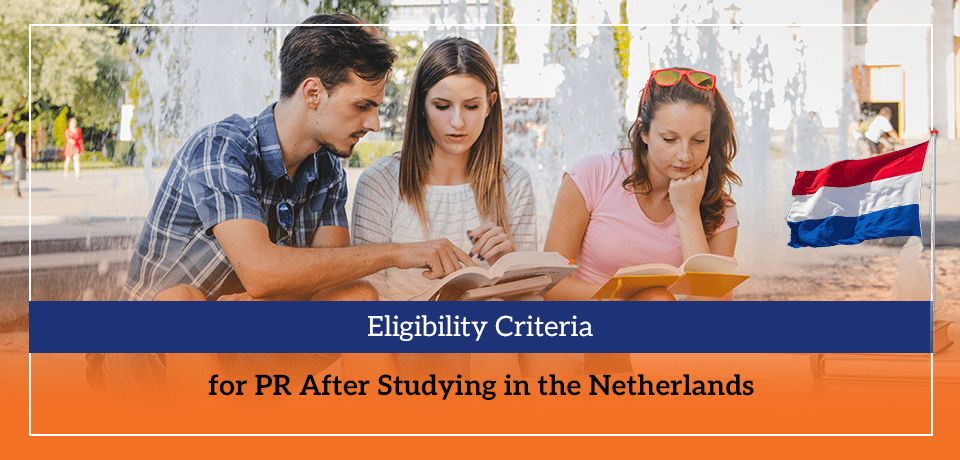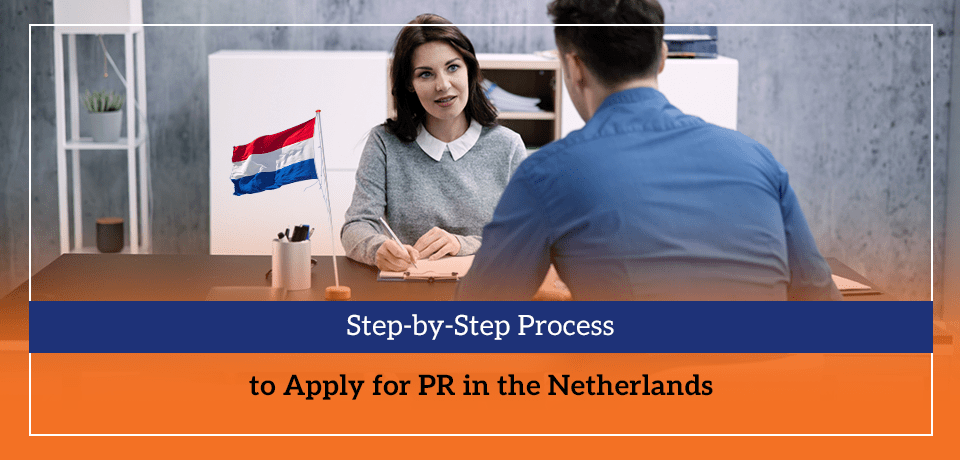Did you know that the Netherlands welcomes over 90,000 international students every year? Many of them dream about building a life here after graduation. And getting Permanent Residence (PR) is a big part of that dream.
In this article, you will learn how to get PR in Netherlands after study. We’ll explain every step in very easy words. You will also know the latest 2025 rules, special tips, and important things to remember.
Whether you just finished studying or you are planning ahead, this guide is for you! Let’s start!
Understanding Permanent Residence (PR) in the Netherlands
Permanent Residence or PR means you can live in the Netherlands for as long as you want. You do not need to keep renewing your visa every few years anymore. It gives you a safe and stable future here.
One of the biggest PR benefits the Netherlands offers is complete work freedom. You can work for any company without needing a work permit, and you can even start your own business if you want!
Another amazing benefit is easy travel across Europe’s Schengen countries. You do not need a visa to visit places like France, Germany, or Spain. Your Dutch PR card will be enough for short travels.
Orientation Year Permit
Students need to get the orientation year permit in the Netherlands before applying for PR. This special permit gives you one extra year to find a good job after graduation. If you get a job during this period, it helps make your PR application stronger.
Permanent Residency vs Citizenship in the Netherlands
Many people get confused about the difference between PR and citizenship. But these are not the same. If you get PR, you stay a citizen of your home country. You live in the Netherlands with full rights, but still keep your original passport.
In contrast, you must apply for Dutch citizenship later if you want a Dutch passport. Depending on your country’s rules, citizenship usually requires you to relinquish your old passport.
PR and citizenship allow you to live, work, and study freely in the Netherlands. However, citizenship gives extra benefits like voting rights and a Dutch passport.
Growing Demand for PR After Study
As of early 2025, no major new PR rule changes have been officially announced yet. However, many experts say more digital applications and faster processing times are expected. It means you can get your PR faster than students did in earlier years!
Many students from India, China, Nigeria, and Indonesia are now applying for Dutch PR. The Netherlands wants talented graduates to stay and work here, so if you are planning to apply after studying, now is a great time!

Eligibility Criteria for PR After Studying in the Netherlands
To apply for PR, you must first meet some important rules. Let’s discuss all the PR requirements that Dutch students must know in 2025.
- Stay for 5 Years: You must have a Dutch residence permit for at least 5 years. It must be for a non-temporary purpose, like study or work.
- Maintain Residence: You must have your main residence in the Netherlands throughout the 5-year period.
- You meet the general rules for all applicants:
- You must have a valid passport or travel document.
- You must not be a danger to public order or safety.
- If you are 12 years or older, you must submit an Antecedents Certificate.
- You have been tested for tuberculosis (TB) after arriving in the Netherlands.
- You need at least a 6.0 score on IELTS. Or, at least 6.0 on another accepted English test (TOEFL, TOEIC, Cambridge English).
- Sufficient Income: You need to show the required income amount. It’s to prove that you can support yourself and cover your expenses in the Netherlands. Your SV salary per month should be € 1,657.
- Civic Integration Exam: You must pass the civic integration exam at least at level A2, or be exempt from it.
- BRP Registration: You must be registered in the Personal Records Database (BRP).
- No False Information: You must not have provided any false or withheld information when applying for your residence permit.
- Non-Temporary Purpose: You must have a residence permit for a purpose other than a temporary stay.
2025 PR Eligibility Checklist
|
Requirement
|
Details
|
|
Stay in the Netherlands
|
5 years with a valid non-temporary residence permit
|
|
Maintain Residence
|
The main residence must be in the Netherlands for 5 years
|
|
Valid Passport
|
A valid passport or travel document
|
|
Language Proficiency
|
Minimum 6.0 score on IELTS or another accepted English test
|
|
Sufficient Income
|
Monthly SV salary of at least €1,657
|
|
Civic Integration Exam
|
Pass civic integration at A2 level or be exempt
|
|
BRP Registration
|
Must be registered in the Personal Records Database (BRP)
|
|
Residence Purpose
|
The permit must be for a non-temporary purpose, like study or work
|

Step-by-Step Process to Apply for PR in the Netherlands
Once you meet all the rules, it’s time to apply for your PR! Let’s go through the full IND PR application process step by step.
Gather the Documents
You must gather all the needed documents, including your valid passport, residence permit, and proof of income. You will also need your civic integration exam results or proof of exemption.
Apply Application Online
Fill out the official PR application form, which is on the Immigration and Naturalisation Service (IND) website, or send it in writing by post.
Pay the PR Application Fee
Pay the PR application fee. As of 2025, the fee is around €243. You must pay this fee when submitting your application. Once you have done so, the IND will send you a confirmation once they receive it.
Wait for The Decision
The IND usually decides on PR applications in 6 months. However, if your documents are complete and clear, it can sometimes be faster.
Collect Your Residence Permit
Once your PR is approved, you will get a five-year PR card. You must renew it every five years, but the process is much simpler than applying for the first time!
Post-Study Work Visa: The Gateway to PR
When you finish studying, you can apply for a special work visa. It is called the orientation year permit in the Netherlands, or in Dutch, zoekjaar. This visa is an excellent option for those seeking to stay longer and secure a suitable job.
You can apply for the zoekjaar permit up to three years after graduation. It gives you one full year to live and work in the Netherlands freely. You do not need a sponsor during this period. You can work any job, even part-time or in an internship, without restrictions.
This Zoekjaar year is very important for your PR journey. It helps you build work experience and later find a full-time job. Many students use this time to meet their PR income requirements more quickly. If you’re curious about post-study pathways in other European countries, explore how Norway supports graduates transitioning to permanent residency.
You must apply for the Orientation Year within three years of graduation. Graduates from the top 200 universities worldwide can apply even without a Dutch degree.
How to Maximise Your Job Chances
Finding a good job during zoekjaar is very important. Here are some quick tips to boost your chances:
- Graduated from a globally recognised institution – Employers often prioritise candidates with degrees from top universities.
- Start networking early by attending Dutch job fairs.
- Use LinkedIn and Dutch job websites like Indeed.nl or LinkedIn Netherlands.
- Learning Dutch is a must to make a better impression at interviews.
- Focus on sectors that need skilled workers like IT, Engineering, or Health.
For example, London is home to some of the best universities for international students, which can significantly enhance your employability in competitive European markets.
Orientation Year vs Highly Skilled Migrant Permit
|
Feature
|
Orientation Year (Zoekjaar)
|
Highly Skilled Migrant Permit
|
|
Duration
|
1 year
|
5 years (renewable)
|
|
Salary Threshold (2025)
|
No minimum salary required
|
Minimum €3,909/month for under 30 years old
|
|
PR Pathway
|
Builds experience
|
Direct pathway to PR
|
|
Sponsorship needed?
|
No
|
Yes, the employer must sponsor
|

Financial Requirements: Proof of Stable Income
When you apply for PR, you must show that you earn enough money. The Dutch government wants to ensure you can live here without needing help. This is called the PR financial proof Netherlands rule.
When you apply, you must have a stable income. As of 2025, the minimum gross income without holiday allowance is around €1,534 per month, and with holiday allowance, it should be € 1,657.
Your job contract must be long-term or permanent. Temporary contracts are sometimes accepted if they are longer than one year.
Acceptable Income Sources for PR
Here are the types of income that are acceptable:
- Salary from a job (the most common and safest option).
- Income from freelance work
- Partner’s income (only if your partner already has Dutch PR or citizenship).
Income from loans, gifts, or benefits is not accepted for PR. You must show an independent and sustainable income earned through legitimate work.
Income Trends for 2025
According to CBS (Statistics Netherlands), the job market is very strong in 2025. Many sectors, like IT, healthcare, and engineering, have salary growth above average. Graduates who work in these sectors meet PR income rules faster.
The Netherlands is also now offering more English-speaking jobs, which is very helpful for international graduates who are still learning Dutch.
Common Challenges and How to Overcome Them
Applying for PR in the Netherlands is exciting. But sometimes, students face a few challenges. Some of the common ones are:
PR Application Delays
One big problem is that the PR application is delayed in the Netherlands. The IND sometimes takes longer to process your file. Delays can happen because of missing documents or too many applications.
So, always submit a full and complete application. Double-check your documents before you send them.
Not Meeting Income Requirements
Another problem is that the applicant’s income does not meet the rules. Some students earn below the minimum needed for PR.
Try to get a full-time job with a permanent contract. Work in growing sectors like tech, health, or finance.
Failing the Dutch Language Test
Some students struggle with the Dutch language test for civic integration. Passing the A2 or B1 level test is needed for PR. To do better, you can join free or low-cost Dutch courses early.
PR Rejection Due to Incomplete Files
Sadly, some PR applications get rejected. Most rejections happen because important documents are missing. Always follow the latest IND checklist carefully.
Alternative Pathways If You Don’t Qualify for PR Yet
Not everyone will get PR immediately after studying. But there are other ways to stay and build your future in the Netherlands. Here are some alternative pathways to consider if you don’t qualify for PR yet.
Long-Term EU Residency Options
If you have lived in the Netherlands for five years, you might be able to apply for EU long-term residency. This option allows you to live and work in any EU country. For instance, countries like Scotland offer streamlined PR routes for graduates contributing to in-demand sectors.
You must meet the following requirements:
- Five years of legal residence in the Netherlands.
- Proof of stable income and health insurance.
- Dutch language proficiency at the A2 level or higher.
After you get long-term EU residency, you can stay in the Netherlands and travel freely across EU countries.
Partner or Spousal Visa Routes
If you are in a relationship with a Dutch citizen or someone with PR, you can apply for a partner visa. This visa allows you to live and work in the Netherlands while your partner is a resident. You must show proof of a genuine relationship and enough financial support.
Entrepreneurial Permits for Startup Founders
Another option is applying for a startup visa or an entrepreneurial permit. The Netherlands is a good place to start your own business. To qualify, your business idea must be innovative and viable. You also need to prove that you have enough funding to support yourself.

Frequently Asked Questions
How long does PR take after applying?
It usually takes up to 6 months to get your PR decision. The IND first checks if you meet all the rules. If they need more papers, they will ask you. If everything is fine, you will get your PR within a year.
Can I include family members in my PR application?
Yes, you can. If they qualify, your partner and children can apply with you. They must also meet all general PR rules, like income and residence. Each family member must fill in their own application form.
Is Dutch language proficiency mandatory?
Yes, Dutch language skills are important for getting PR in the Netherlands. You must pass the exam at least at the A2 level. Or you must show that you are exempt from the exam. Without proof of Dutch skills, your PR application can be rejected.
What happens if my PR application is rejected?
If your PR application is rejected, the IND will explain why. You can file an objection within 4 weeks after the decision. You will need to explain why you disagree with them. If that fails, you can appeal to a Dutch court.
Does freelance work count toward financial requirements?
Yes, freelance work can count if you meet income requirements. You must show proof of stable freelance income over time and have monthly earnings above the minimum income threshold.
Can I apply for PR during the Orientation Year?
No, you cannot apply for PR during the Orientation Year. The Orientation Year permit is for temporary stay only. You must have 5 years of non-temporary stay before applying. Use the Orientation Year to find a permanent job first. After getting a new permit, you can start counting toward PR.
How does Brexit affect EU students applying for PR?
Brexit mostly affects UK students, not students from other EU countries. If you are a UK citizen, you now follow regular third-country rules. You must meet the same PR requirements as non-EU students. Nothing changes for you if you are from the EU (not the UK).
Are there exemptions for the civic integration exam?
Yes, there are some exemptions for the civic integration exam. You are exempt if you have a Dutch diploma or studied in Dutch. You may also be exempt if you have serious health issues. In some cases, a higher-level language diploma can also exempt you.
Can I travel outside the Netherlands during the PR process?
Yes, you can travel while your PR application is being processed. However, you must keep your current Dutch residence permit valid. If your permit expires, your PR application might get rejected.
Do PhD graduates get faster PR pathways?
PhD graduates do not automatically get faster PR approval. However, their research time often counts towards the 5-year stay requirement. If you did a PhD in the Netherlands, it will help you. You must still meet all other PR rules, like income and language.
Conclusion
Getting a PR is a big dream for many students in the Netherlands. It opens the door to live, work, and build a beautiful life in this amazing country. But first, you must understand the full process of how to get PR in Netherlands after study.
It may feel like a long journey, but it becomes much easier with good planning. Take your steps one by one, stay patient, and very soon, you can call it your forever home. Good luck with your PR journey!